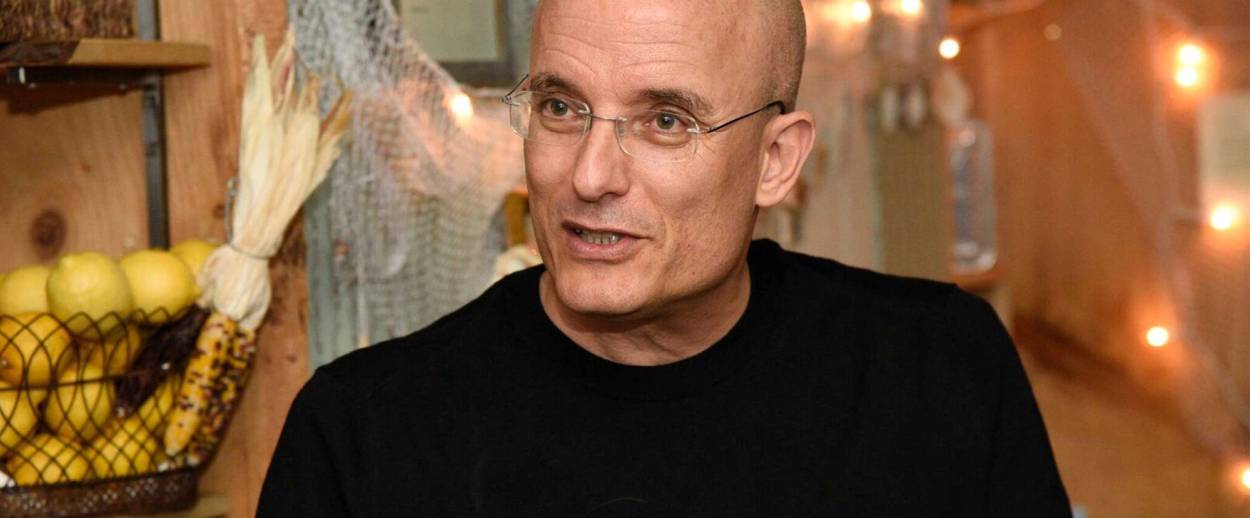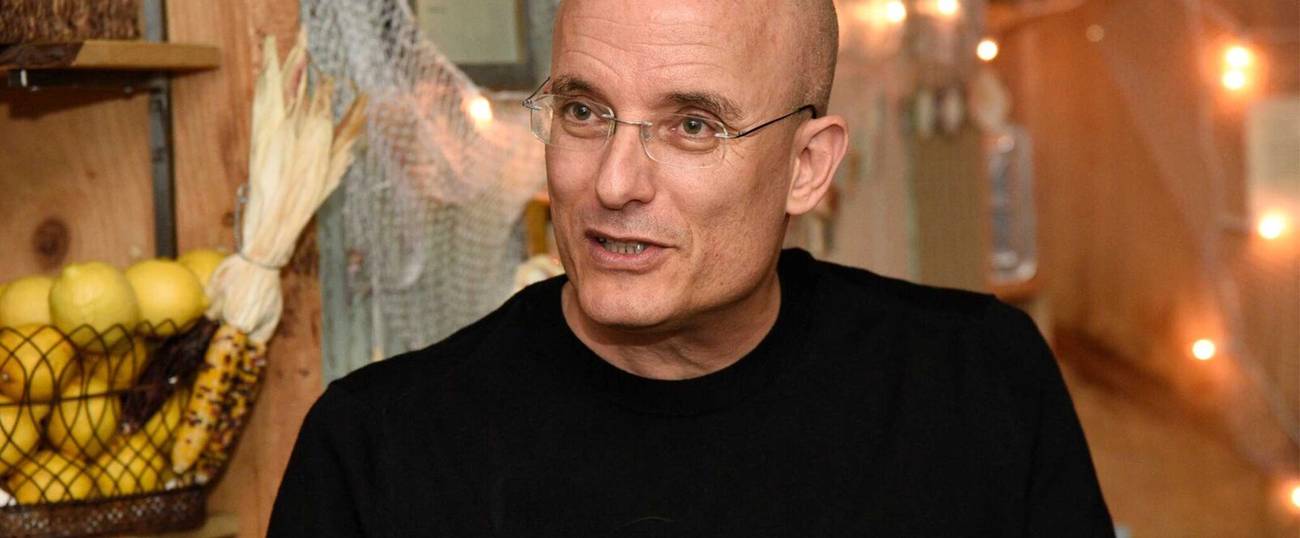A Recipe for a Sweet Childhood
In ‘Candies From Heaven,’ Israeli food writer Gil Hovav recalls his early years in Jerusalem—and the food that meant the most to him




“Jerusalem was a very sweet city to grow up in,” Israeli food writer Gil Hovav told me over lunch recently at a restaurant in downtown Chicago. “In the ’60s and ’70s, it was the cultural center of Israel and a very diverse city. It’s not the case anymore. It’s changed a lot. It’s a lovely place to visit but it’s become more religious and less tolerant—very tense.”
Hovav’s memories about the Jerusalem of his youth and, of course, the food he ate growing up form the backbone of Candies From Heaven, Hovav’s new book of essays, translated by Ira Moskowitz, out this month. His stories are about a family that “built a home for me and built a state for me, who infused me with happiness, warmth, and love,” and the uncomplicated but immoderate joys and challenges synonymous with childhood. So intimate is the narrative that, rather than writing as a man looking back on that childhood, Hovav’s voice is one of a boy affectionately called Gili relating events as if they had happened within the past few hours.
The book includes tales of summer soccer games with the neighborhood children that surpass any English Premier League match in terms of sheer rivalry; the life lessons Hovav learned from his grandmother Mooma, who never tempers an opinion with diplomacy; the challenges of avoiding deadly insects in an attempt to sneak home after staying out too late; and trying to find a summer job after losing his entire allowance to his mother during a poker game. At the close of each hilarious but surprisingly profound essay are recipes—more than 20 of them, from porridge laced with rose water to his Aunt Levana’s carrot salad.
“It was a Shabbat morning in the spring and the smells of cooking wafted from the windows of the neighboring homes,” Hovav writes in an essay called “How to Divide a Chicken into Five Quarters,” which ends with a recipe for oven-roasted potatoes to help readers re-create the scene. “Sitting on balconies were men in their undershirts, women crowned with bigoudis (hair rollers), and cats intoxicated by the sun.”
Family plays a large part in Hovav’s book—and that’s no surprise. His family was famous in Israel many years before Hovav became a celebrity himself. His great-grandfather was Eliezer Ben-Yehuda, who led the revival of Hebrew as a modern language. And his parents, Moshe and Drora Hovav, were famous in their own right as television stars.
“When I was growing up the real celebrities were my father and mother, who were big news announcers, not my great-grandfather who revived Hebrew,” Hovav said. “It was like being the son of Dan Rather. My father’s voice opened doors. I wouldn’t pretend that it didn’t help me in my career. But throughout my career, I’ve met tons of idiots who are descendants of geniuses. It’s up to me to prove I’m not an idiot.”
As one of Israel’s leading food critics, Hovav has become a celebrity on his own, playing a major role in defining modern Israeli cuisine. He began as a bar and restaurant reviewer for newspapers such as Yediot Aharanot before becoming a renowned columnist and presenter on Israeli television. He has published three bestselling novels and 15 cookbooks. Confessions of a Kitchen Rebbetzin was the first to be published in English, in 2012, and led to Hovav becoming a foodie ambassador of sorts, traveling around the world presenting cooking seminars and lectures on Israeli cuisine.
While Hovav’s cooking shows such as Pepper Garlic and Olive Oil, Food for Thought, and Captain Cook were and are considered staple viewing on Israeli television, he has avoided reality television cooking competitions that exploded in popularity in the U.S. and, as Hovav noted with some chagrin, invaded his home country, which has become “increasingly Americanized.”
“I refuse to participate in any reality show in Israel,” he said. “It’s fake and wrong and I hate it. I don’t want to sit there and tell 70-year-old Ethiopian ladies, ‘You cook it nicely but you don’t cook it right.’ Who am I to say that? Master Chef and Super Chef and Iron Chef and My Butt Chef … it’s all a gladiator scene that I don’t have to be a part of. I want food to be real. I like a roast that comes in a pot with a lid, preferably cooked by an old lady.”
The simple family recipes he recalls in Candies From Heaven would not make for blockbuster TV ratings, he acknowledges.
“The problem is that food has got to be so hip and hyped, and chefs the new rock stars, that it’s already artificial,” he said. “Molecular food was a dreadful, embarrassing mistake, of course, but, today, if you want to be successful you have to cook Instagram food: red, orange, or yellow dishes that the camera likes. Shooting chocolate ice cream is hell because it looks like shit. So, nobody makes it anymore. They will make a cranberry parfait, but who wants a cranberry parfait? I want my chocolate ice cream!”
The family Hovav writes about in his book refused to handle a single moment with kid gloves. That attitude explains why Hovav was nervous to come out to them as a gay man—a moment he did not include in Candies From Heaven.
“You know you’re gay, but you’re taught to dream the dreams of straight people,” he told me. “I was 25 and living with my girlfriend for a year and I realized that I loved her but I was not in love with her. I had to make a change. My parents were dead but I came out to the rest of my family. It was so disappointing! They couldn’t care less! They said, ‘We always knew you were gay.’ I said, ‘Why didn’t you tell me? I wasted so much time!’”
Today Hovav lives in Tel Aviv with Daniel Halperin, his partner of over 30 years, and their daughter, Naomi. While their life is not covered in Candies From Heaven, the enduring love and straightforward manner passed down through generations clearly inform the family man he has become.
For instance, his Aunt Hadassah is a significant part of that foundation. She’s described in the book as a woman who “never despaired in her attempts to turn my brother and me, two skinny Jerusalem kids, into ordinary joyful Cossacks.”
“She was like a second mother to me. Just amazing, and the crazy one of the family,” Hovav told me. “I introduced her to Danny in a café like this. She was really behaving herself, and then she said to Danny, ‘I have only one question: Are those really your teeth?’”
But Hovav is more than aware that, like the Jerusalem of his youth, nothing remains the same and each moment must be treasured before it is forever lost.
“Mooma died on a Monday exactly six weeks after my mother died,” he writes in Candies From Heaven. “All her life, Mooma was lucid and sharp as a razor. During her last six weeks, she started to fade. Perhaps I should have understood it was the end. Perhaps I should have remained at her side. Perhaps we’re actually not moving forward but heading back to the place where we knew love.”
***
Like this article? Sign up for our Daily Digest to get Tablet Magazine’s new content in your inbox each morning.
Gretchen Rachel Hammond is an award-winning journalist and a full-time writer for Tablet Magazine.